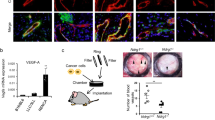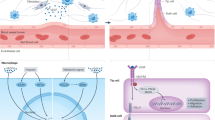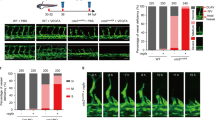Abstract
ANGIOGENESIS, the sprouting of capillaries from pre-existing blood vessels, is a fundamental process in the formation of the vascular system during embryonic development. In adulthood, angiogenesis takes place during corpus luteum formation and in pathological conditions such as wound healing, diabetic retinopathy, and tumorigenesis. Vascularization is essential for solid tumour growth and is thought to be regulated by tumour cell-produced factors, which have a chemotactic and mitogenic effect on endothelial cells1–4. Vascular endothelial growth factor (VEGF), a homodimeric glycoprotein of relative molecular mass 45,000, is the only mitogen, however, that specifically acts on endothelial cells, and it may be a major regulator of tumour angiogenesis in vivo5,6. Its expression has been shown to be upregulated by hypoxia, and its cell-surface receptor, FIk-1, is exclusively expressed in endothelial cells7,8. Here we investigate the biological relevance of the VEGF/Flk-1 receptor/ligand system for angiogenesis using a retrovirus encoding a dominant-negative mutant of the Flk-1/VEGF receptor to infect endothelial target cells in vivo, and find that tumour growth is prevented in nude mice. Our results emphasize the central role of the FIk-1/VEGF system in angiogenesis in general and in the development of solid tumours in particular.
This is a preview of subscription content, access via your institution
Access options
Subscribe to this journal
Receive 51 print issues and online access
$199.00 per year
only $3.90 per issue
Buy this article
- Purchase on Springer Link
- Instant access to full article PDF
Prices may be subject to local taxes which are calculated during checkout
Similar content being viewed by others
References
Folkman, J. J. natn Cancer Inst. 82, 4–6 (1990).
Folkman, J., Watson, K., Ingber, D. & Hanahan, D. Nature 339, 58–61 (1989).
Risau, W. Progr. Growth Factor Res. 2, 71–79 (1990).
Folkman, J. & Klagsbrun, M. Science 235, 442–447 (1987).
Plate, K. H., Breier, G., Weich, H. A. & Risau, W. Nature 359, 845–848 (1992).
Shweiki, D., Itin, A., Soffer, D. & Keshet, E. Nature 359, 843–848 (1992).
Millauer, B. et al. Cell 72, 835–846 (1993).
Plate, K. H., Breier, G., Millauer, B., Ullrich, A. & Risau, W. Cancer Res. 53, 5822–5827 (1993).
Kashles, O., Yarden, Y., Fischer, R., Ullrich, A. & Schlessinger, J. Molec. cell. Biol. 11, 1454–1463 (1991).
Redemann, N., Holzmann, B., Wagner, E. F., Schlessinger, J. & Ullrich, A. Molec. cell. Biol. 12, 491–498 (1992).
Amaya, E., Musci, T. J. & Kirschner, M. W. Cell 66, 257–270 (1991).
Ueno, H., Colber, L. H., Escobedo, J. A. & Williams, L. T. Science 252, 844–848 (1991).
Miller, A. D. & Rosman, G. J. Biotechniques 7, 980–988 (1989).
Newman, P. J. et al. Science 247, 1219–1222 (1990).
Kim, K. J. et al. Nature 362, 841–844 (1993).
De Vries, C. et al. Science 255, 989–991 (1992).
Chen, C. & Okayama, H. Molec. cell. Biol. 7, 2745–2752 (1987).
Gorman, C. M., Gies, D., McCray, G. & Huang, M. Virology 171, 377–385 (1989).
Stewart, C. L., Schuetze, S., Vanek, S. & Wagner, E. EMBO J. 6, 383–388 (1987).
Author information
Authors and Affiliations
Rights and permissions
About this article
Cite this article
Millauer, B., Shawver, L., Plate, K. et al. Glioblastoma growth inhibited in vivo by a dominant-negative Flk-1 mutant. Nature 367, 576–579 (1994). https://doi.org/10.1038/367576a0
Received:
Accepted:
Issue Date:
DOI: https://doi.org/10.1038/367576a0
This article is cited by
-
Design and cytotoxic evaluation via apoptotic and antiproliferative activity for novel 11(4-aminophenylamino)neocryptolepine on hepatocellular and colorectal cancer cells
Apoptosis (2023)
-
Mutual regulation between phosphofructokinase 1 platelet isoform and VEGF promotes glioblastoma tumor growth
Cell Death & Disease (2022)
-
A novel rat model of pulmonary hypertension induced by mono treatment with SU5416
Hypertension Research (2020)
-
Discoidin-domain receptor coordinates cell-matrix adhesion and collective polarity in migratory cardiopharyngeal progenitors
Nature Communications (2019)
-
Relationship of common variants in VEGFA gene with osteonecrosis of the femoral head: A Han Chinese population based association study
Scientific Reports (2018)
Comments
By submitting a comment you agree to abide by our Terms and Community Guidelines. If you find something abusive or that does not comply with our terms or guidelines please flag it as inappropriate.



